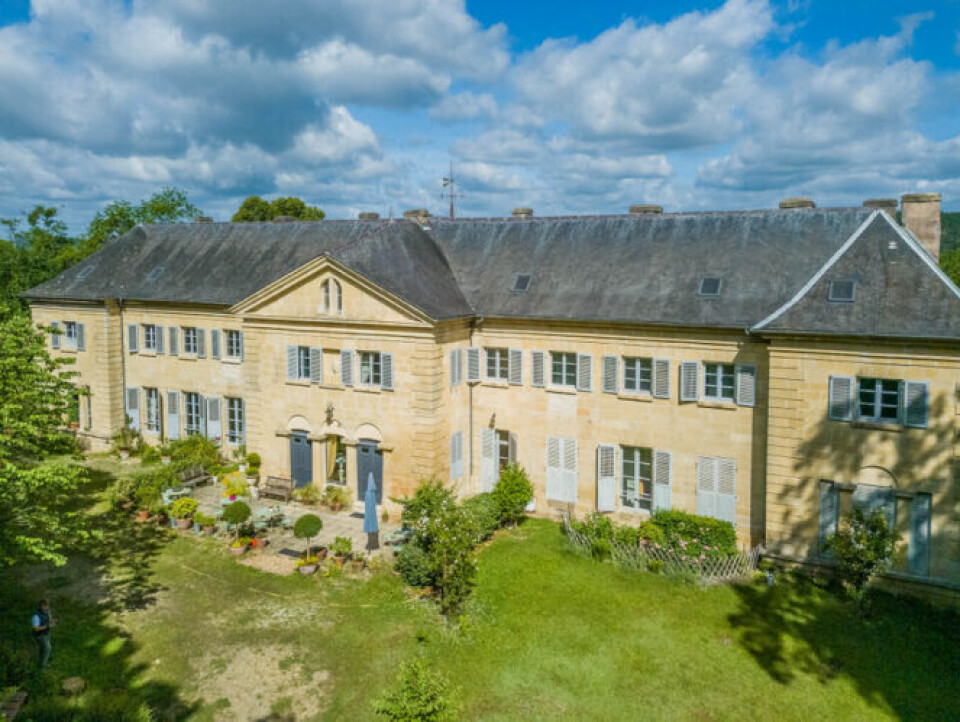-
What are penalties for not conforming with new septic tank request?
Some financial aid is available for homeowners needing to install new tanks
-
Are second homes in France a good investment?
Investment picture is variable depending on geographical location
-
See what €50,000, €200,000 and over €500,000 buys in Seine-Maritime
Towns and villages have distinct Norman French architecture
Pool building ban, landlords lose Pau appeal and other property news
We also look at a Dordogne castle for sale with a grisly backstory, how Macron’s pension reforms will impact mortgages and more

Mayor bans construction of swimming pools over drought risks
Homeowners in a town near Perpignan are forbidden from building swimming pools on their property until at least the end of April.
The mayor of Elne, Nicolas Garcia, issued the decree on March 7 as the department struggles with a drought.
Read more: Drought map: See what water restrictions apply in your department
The new rule can in theory be extended beyond April 30 and last from a few months to a few years, according to Mr Garcia.
As well as prohibiting the construction of swimming pools, any new well or domestic drilling site will also be refused planning permission. However, those already under construction will not be affected by the new measure.
Mr Garcia told Actu Perpignan that drilling sites present a "risk of contamination of the water table" and swimming pools a "very rapid depletion” of it.
"In recent years, requests to build a swimming pool have been exponential in Elne. Since Covid, there have been about a hundred," he added.
The decree comes in the context of the ongoing drought situation across much of France.
Read more: Two more departments on drought alert after France’s record dry period
In Pyrénées-Orientales, where Elne is located, only 200mm of rain has fallen over the last 11 months instead of an average of 500mm over the same period.
In Var, meanwhile, lack of water has forced nine communes to declare that no more building permits will be issued for the next four years.
Read more: Drought: Building permits suspended in nine south of France communes
Groundwater levels are historically low, and authorities have decided that it is not possible to welcome any new residents at the current time, nor allow any new building projects to take place.
They say the population is already too high to ensure that each resident will have adequate access to water this summer.
Only construction permit applications submitted before February will be considered.
‘Anti-Airbnb law’ gets go-ahead in Pays Basque
Landlords in southwestern France have lost their appeal against new rules requiring any short-term holiday lets they advertise to be offset with a similar-sized property in the same town exclusively for year-round rental.
The legislation, brought in to stop local people being pushed out of the area by high-yield short-term lets, was first introduced in Pays Basque last March.
However, it was halted in June after 65 private landlords, property agencies and concierge services joined together to request the legal suspension of the measures, which they said amounted to a “serious attack” on their commercial and professional operations.
They also contested that the housing shortage was linked to the development of tourist rentals.
Read more: Residents’ anger after French court suspends short-term rentals rule
However, the administrative court in Pau this month dismissed their case, insisting that the "demand for long-term rental accommodation accessible to all is not satisfied by the existing supply”.
The judges added that the housing shortage cannot be resolved by a “less restrictive measure".
More than 16,000 furnished holiday lets have been identified in the 24 communes of the Basque Country considered under housing pressure, including Bayonne and Biarritz – an increase of 130% between 2016 and 2020, according to the Atlantic and Pyrenees Town Planning Agency (Audap).
Landlords will now have to compensate by proposing a space that can be used for long-term rental accommodation in the same town. This must be equal to the number of square metres ‘lost’ to short-term rentals, and cannot involve building new properties.
France needs 5 million new homes over the next decade
Nearly 5 million properties must be built in France in the next 10 years to keep up with housing demand, new research claims.
A study by ESCP Junior Conseil for the Federation of Property Developers found 449,000 new homes are required each year, with France’s 20 largest cities accounting for 37% of demand, reports Les Echos.
Some 60,000 homes are needed in the Ile-de-France, 12,500 in Aix-Marseille and 5,000 in Rennes, it said.
In reality, however, France is lagging. While 483,300 new homes were authorised in 2022, only 370,800 have been built, according to the latest figures from the Ministry of Ecological Transition.
The need for new housing is in part driven by population growth (accounting for 7% of the total number of properties to be built, or 26,000 dwellings per year), as well as immigration (16%, or 71,000 dwellings per year).
Most of the demand, however, is linked to ‘de-cohabitation’. The study found divorces, separations and the departure of adult children from a household account for 34% of new housing needs (152,000 homes per year).
Louis Ziz, vice president of the FPI, told Les Echos that this does not necessarily mean people will buy brand-new houses.
“But if a person who gets divorced moves into an old home, the person who leaves that home will look for another one, and so on. We have tried to measure the overall need for growth in the stock according to different developments,” he said.
Other factors driving the need for new housing include existing properties becoming unsuitable, either because of structural problems such as cracks or by being located in an area with little demand for housing.
The research also highlights an additional 84,000 properties per year that will be off the market after being bought as second homes and 50,000 properties that will be in such a state that energy renovation would be too expensive.
Read more: Minister ‘open’ to seizing empty homes for people in need in France
Dordogne castle for sale has a chilling past

The scene of an unsolved triple murder in Dordogne is for sale for just over €1.6 million.
Château d'Escoire was built in the 18th century but became infamous in France on the night of October 24, 1941, when Henri Girard discovered the bodies of his father Georges Girard, owner of the château, his aunt Amélie, and their maid, Marie Soudeix. They had all been killed with an axe.
Henri, who had slept in a wing of the château that night, was later arrested for the crime and spent 19 months in prison until his trial. He was eventually acquitted due to lack of evidence and the unsolved murders subsequently inspired a slew of books and TV documentaries.
Henri went on to become a writer, under the pen name Georges Arnaud and published Le Salaire de la peur in 1950, which sold two million copies and was made into a cult film in 1953.
In 1954, the castle was listed as a monument historique and served for several years as a holiday camp for children before being abandoned for years.
It was bought and renovated in 2015, with part of the building converted into guest rooms.
Read more: A chateau for just €100? French mairie buys fairytale ruin
In its listing, estate agent Leggett Immobilier describes the property as a “magnificently restored 18th-century neoclassical castle”, emphasising its “panoramic view” of the valley and the village of Escoire (12km from Périgueux), as well as its potential for a bed and breakfast business, gîtes or a hotel.
Read more: Dordogne: Family move to second chateau after error with first choice
It comprises eight bedrooms, a studio, a large swimming pool and various outbuildings.
Why pension reforms are likely to push up mortgage costs
Insurance experts are warning that the government’s controversial pension reforms could have an impact on the cost of borrowing for homeowners.
Raising the minimum retirement age from 62 to 64, they say, would lead to an increase in the insurance linked to mortgages.
Read more: Age, new minimum amount: What does France’s pension reform involve?
For anyone taking out a mortgage in France, an insurance called assurance emprunteur is compulsory. There are three parts to this: life assurance (called death insurance in France), PTIA (permanent and total incapacity insurance) and ITT (total temporary incapacity to work).
It is the latter which is impacted, in this instance, as loan insurance contracts will have to cover the risk of a homeowner being temporarily unable to work for two additional years.
Read more: Historic change to mortgage insurance in France starts today
"Today, there are few claims covered by the ITT guarantee between the ages of 62 and 65, because few borrowers exceed the legal retirement age," Astrid Cousin, of loan insurance comparison service Magnolia.fr, told Le Figaro.
However, the potential increase in claims for loans repaid after the age of 62 could push private insurers to increase their rates by between 2% and 5%, according to projections by the comparison site.
It says that for a single person of about 40 years of age, who wishes to borrow €200,000 over 25 years, the cheapest quote offered by a private insurance company is €8,627 – an average monthly cost for the borrower of €29.
A 5% increase would equate to an extra €1.45 each month or €435 over the duration of the loan.
Related articles
Scams, squatters and price slumps: Five French property updates
Updated: Your questions answered on France’s new form for homeowners
Why French mairies are turning to private firms to recoup property tax
























